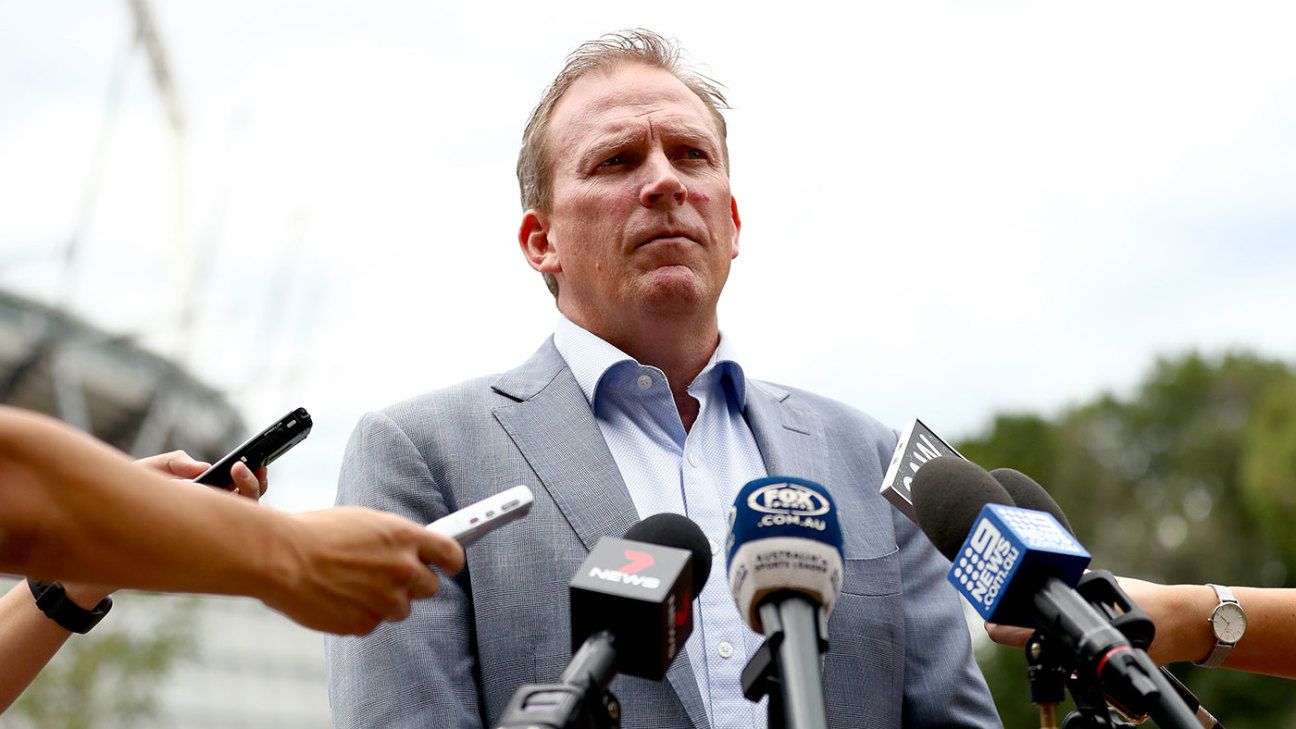Desperation to end more than two months of instability for Cricket Australia is expected to lead to the exit of its chief executive Kevin Roberts, as the board reconsiders earlier plans for deep staff cuts to the governing body in light of a rapidly improving outlook beyond the Covid-19 pandemic.
A major round of redundancies, perhaps consuming up to 20% of CA’s staff, was planned to take place this week, but this scenario is believed to have been undergoing revision in recent days amid a raft of good news about the outlook for sport next summer, including the opening of state borders and allowances for crowds at matches.
CA is facing rumblings of discontent from the broadcasters Fox Sports and Seven, who are eager to renegotiate their six-year, A$1.18 billion deal signed in early 2018. Unlike the AFL and NRL, however, there has not yet been any content lost, leaving only the Covid-19 crisis signalling of CA itself as the potential trigger for talks about a fee reduction.
It had already announced a full international schedule for the summer, with four Tests, three ODIs and three T20Is against India as the centre-piece, with the Big Bash League schedule’s announcement set to be imminent also. However, the unrest among CA’s state associations, the Australian Cricketers Association (ACA) and also within CA’s staff about stand downs and cuts already made across the country have left the board searching for a circuit-breaker to allow the game to move forward.
Last week the New South Wales chairman John Knox wrote to his CA counterpart Earl Eddings, asking for a collective meeting of the state and ACA chairmen to forge a fresh path out of Covid-19, a request that Eddings accepted in principle. But the mere fact that most effective communication over the past 10 weeks has been taking place on a state, ACA and CA board level, rather than involving Roberts, spoke volumes for his weakening position.
Roberts, who took over from James Sutherland in October 2018 after his predecessor served for nearly 18 years as one of the most respected CEOs in Australian sport, has lasted little more than 18 months, about halfway through the original three-year term of his contract.
Reservations about Roberts’ ability to handle relationships with a broad array of stakeholders were first raised when he led unsuccessful negotiations with the ACA over their collective bargaining agreement in 2017, ultimately sidelined for Sutherland to thrash out a compromise with his opposite number Alistair Nicholson with international cricket looming.
However, this was not enough to change the former chairman David Peever’s view that Roberts was the right man to succeed Sutherland, with the change announced in June 2018. Peever was himself compelled to resign as CA chairman later in 2018, after Knox and NSW withdrew support in the wake of a damning cultural review of the organisation.
Working alongside a new chairman in Eddings, Roberts attempted to improve relationships while also watching the national team pick up from the lows of the Newlands scandal to perform creditably on the dual World Cup and Ashes tour of England last year. A winning home summer was capped by the victory of the women’s T20 team in a stunning World Cup final in front of 86,000 spectators at the MCG, before the looming Covid-19 crisis threw Roberts and his board into a state of self-preservation.
Based on forecasting done at the height of uncertainty in March, a team including Roberts, Eddings, fellow directors Paul Green and Michelle Tredenick, chief operating officer Scott Grant and acting chief financial officer Paul Reining mapped out a plan to cope with 50% revenue shortfalls for next summer. It called for deep reductions in state grants, cuts to player pay and stand downs and eventually redundancies for a major portion of CA staff, while also securing a A$100 million credit facility from the Commonwealth Bank.
They were not to be dissuaded from that path, even as the states argued for their cutbacks to be reduced – NSW and Queensland have still not signed on – and the ACA and staff questioned the thinking and forecasting upon which the cuts were based. As recently as the first week of June, Roberts was informing states and the ACA of forecasts that appeared to still account for a summer without a tour by India, despite previously announcing the schedule and indicating the tour was a “nine out of 10” chance of occurring.
In the vacuum, five of the six state associations have made piecemeal cuts in a hodgepodge of different areas, amounting to more than 150 staff losses. At the same time, Roberts and CA were drawing up their own plans for redundancies, but the process appears to have been brought to a grinding halt following last week’s government announcements about borders re-opening and crowds returning to live sport on an incremental basis.
